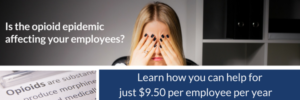 Do EAPs Work or Are They Just a “Feel Good” Benefit?
Do EAPs Work or Are They Just a “Feel Good” Benefit?
Employee Assistance Programs (EAPs) help employees by offering them various services that primarily focus on their mental health and well-being, while the employer enjoys the increased productivity that comes with a happy, mentally stable workforce. While that may seem “feel good” – the good certainly wins in this case particularly in light of the current opioid crisis and the affect that is having on families and businesses.
What Do EAPs Do For the Workplace?
EAPs are designed to offer immediate counseling to employees that may be facing emotional and mental issues. These problems may be caused by stress, a condition like depression or high anxiety, substance abuse, problems at home and other sources of mental and emotional discomfort. Often, an employee affected by one or more of these stresses won’t want to turn to their employers and alert them of the problem(s) because they don’t want other people to know or they fear of losing their job.
While EAPs are offered through the company, the counseling and support received by these programs are always from a third-party. This guarantees confidentiality and helps make this form of assistance more approachable by troubled employees. The hope is that these counseling options will help employees get back to feeling stable and happy to show up to work each day.
Why Would An Employer Offer an EAP?
Businesses want happy employees and benefit from the services provided through an EAP because they help to ensure that employees get the help they need to remain mentally ‘in check’. When over-stressed or depressed employees are in a state of despair, they are much less productive, more likely to be absent from work and there is a higher chance of them quitting. All of these adverse effects hurt a company’s bottom line. Thus, by offering an EAP and resolving many of these issues that would otherwise go unnoticed and unchecked, businesses can improve their bottom line and help their employees at the same time.
Are They Effective?
So, the real question is, do these programs achieve this goal of helping both employees and employers? While there is some research on this subject, most of it is unqualified or has been conducted by an EAP provider and thereby draws a lot of criticism for being biased. That said, the consensus seems to be that these programs do work as intended, but there are some small issues to consider as you think about implementing an EAP.
The first is that employees are not always made aware of these programs, which makes them vastly underutilized in some companies. Employers that invest in an EAP need to make an effort to notify and remind employees of its existence and many benefits.
The second biggest issue is professionalism of the EAP providers. You must do your research and partner with a non-biased 3rd party who will not turn over confidential information over to you – as an employers. The very nature of an EAP demands privacy and you should only work with a reputable firm.
Summary: EAPs do work, but they come with their own set of challenges. To get the most out of this service and its ability to keep employees emotionally happy and thereby more productive and loyal, you have to engage your employees on the program and it’s intended purpose. This means absolutely guaranteeing them their privacy and confidentiality when utilizing the program.
If you’d like to learn more about an EAP program for your business, just complete the below and we’ll send along!
